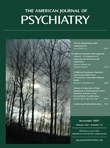Complicated Grief: A Case Series Using Escitalopram
To The Editor: The syndrome of complicated grief is not formally recognized in DSM-IV, but it is associated with significant functional impairment and distress (1) . A grief-focused psychotherapy, complicated grief therapy, recently demonstrated efficacy for complicated grief in a randomized controlled trial (1) . To our knowledge, there are no randomized controlled trials of pharmacotherapy for complicated grief. An open-label study of paroxetine in combination with a version of complicated grief therapy did not allow determination of medication efficacy beyond that of psychotherapy on grief symptoms (2) . Open-label bupropion showed modest effects for grief (3) , but nortriptyline demonstrated no significant effect on grief in open-label (4) and randomized controlled trial (5) studies of bereavement-related depression.
We prospectively examined four individuals with a primary diagnosis of complicated grief (defined as a score of ≥25 on the Inventory of Complicated Grief ≥6 months after the death of a loved one) in a 10-week pilot study of open-label escitalopram. The institutional review board of Massachusetts General Hospital approved the study. Participants gave written informed consent and received escitalopram flexibly in doses of 10 to 20 mg daily.
Participants were all female, with a mean age of 41.75 years (SD=14.4). The primary loss was 2.94 years (SD=1.4) prior. Posttraumatic stress disorder (PTSD) (allowing loss as A1 criteria only) was present among 75% of subjects, 75% had at least one other lifetime anxiety disorder, and all had a lifetime major depressive episode (50% current, 50% past). Each patient tolerated titration to 20 mg/day and completed the 10-week study “very much improved” (Clinical Global Impression-Improvement=1). There was a statistically significant mean reduction in Inventory of Complicated Grief (34.5 [SD=6.0] to 8.25 [SD=3.0]; paired t=8.97, df=3, p=0.001), 25-item Hamilton Depression Rating Scale (16.25 [SD=5.6] to 4.00 [SD=2.9]; paired t=7.4, df=3, p=0.005), and Clinical Global Impression-Severity (5.0 [SD=0] to 1.75 [SD=0.5]; paired t=13.00, df=3, p=0.001) scores.
Given the limitations of a small cohort size and open-label assessments, these preliminary results suggest that selective serotonin reuptake inhibitor (specifically escitalopram) pharmacotherapy alone may result in significant improvement without concomitant psychotherapy in individuals with complicated grief and that randomized controlled trials examining pharmacotherapy for complicated grief are needed.
1. Shear K, Frank E, Houck PR, Reynolds CF III: Treatment of complicated grief: a randomized controlled trial. JAMA 2005; 293:2601–2608Google Scholar
2. Zygmont M, Prigerson HG, Houck PR, Miller MD, Shear MK, Jacobs S, Reynolds CF III: A post hoc comparison of paroxetine and nortriptyline for symptoms of traumatic grief. J Clin Psych 1998; 59:241–245Google Scholar
3. Zisook S, Shuchter SR, Pedrelli P, Sable J, Deaciuc SC: Bupropion sustained release for bereavement: results of an open trial. J Clin Psych 2001; 62:227–230Google Scholar
4. Pasternak RE, Reynolds CF III, Schlernitzauer M, Hoch CC, Buysse DJ, Houck PR, Perel JM: Acute open-trial nortriptyline therapy of bereavement-related depression in late life. J Clin Psych 1991; 52:307–310Google Scholar
5. Reynolds CF III, Miller MD, Pasternak RE, Frank E, Perel JM, Cornes C, Houck PR, Mazumdar S, Dew MA, Kupfer DJ: Treatment of bereavement-related major depressive episodes in later life: a controlled study of acute and continuation treatment with nortriptyline and interpersonal psychotherapy. Am J Psychiatry 1999; 156:202–208Google Scholar



